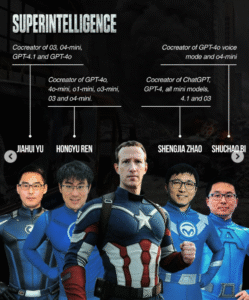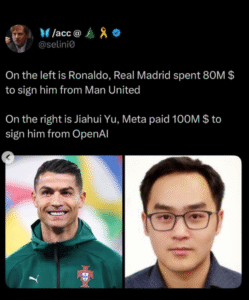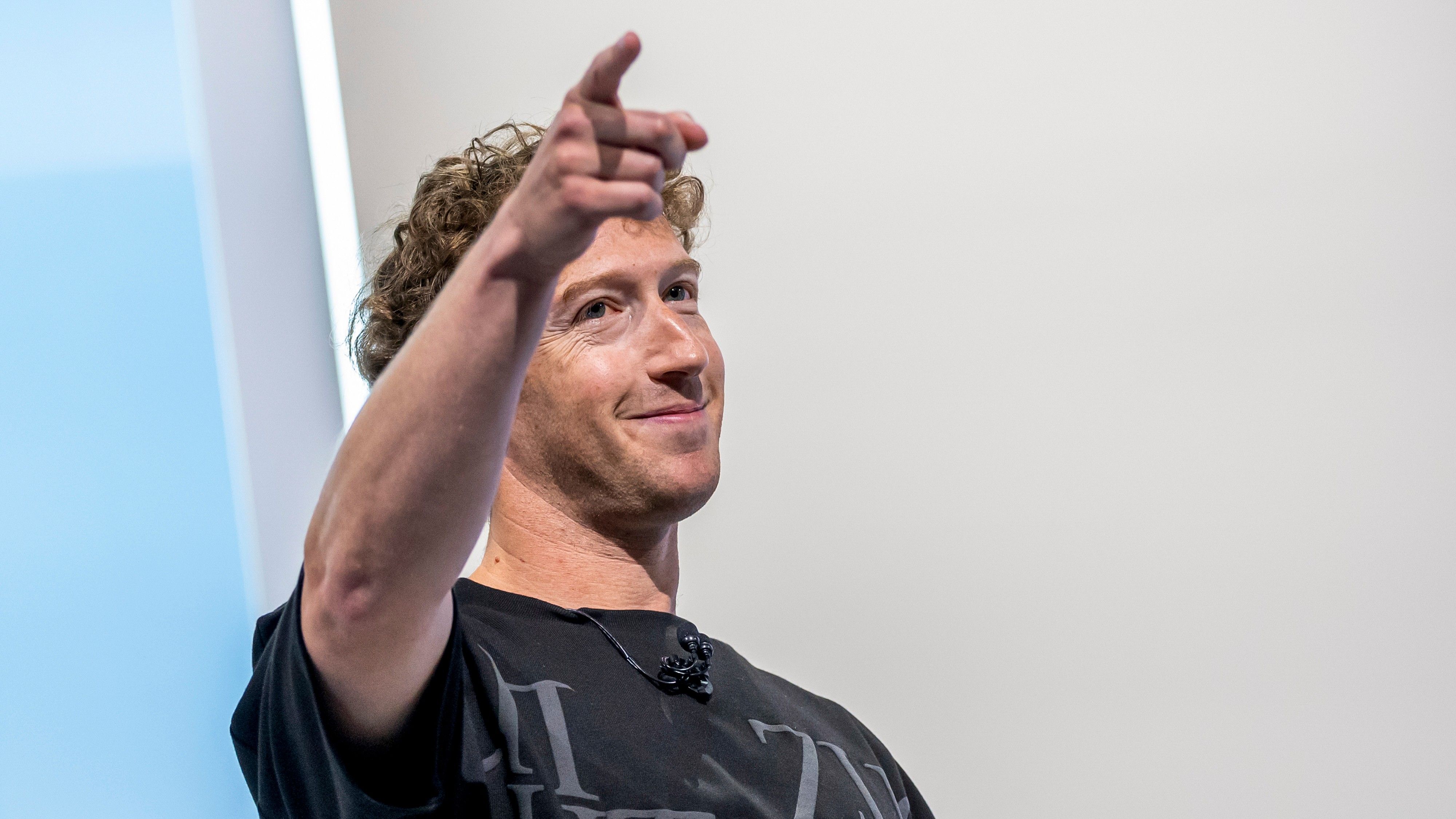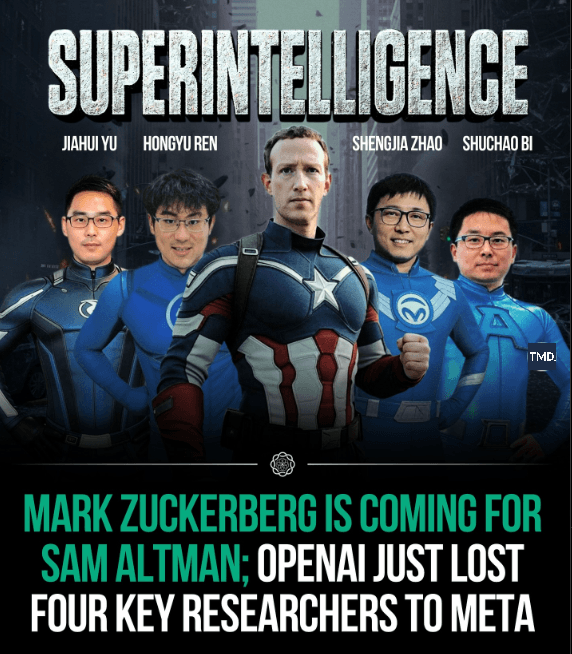7 game-changing truths about Meta AI Avengers—including mind-bending salary figures like $100M for Jiahui Yu. See how Meta’s mega hiring spree is redefining tech, ethics, and talent warfare.
1. Meta AI Avengers: The Boldest Team in Silicon Valley
Let’s not sugarcoat it— Meta is done watching from the sidelines. With an estimated $15 billion pumped into a full-throttle AI strategy, it’s not just playing to compete. It’s playing to win. The global AI market is hovering around $400 billion, and Meta wants the biggest slice.

But what raised eyebrows wasn’t the money—it was how they spent it. Rather than licensing tech or acquiring startups, they did something bolder: they bought the people behind the most powerful AI models in the world.
2. Meta’s $15 Billion Power Move in AI
Insiders are calling it Meta’s version of the Avengers—and honestly, they’re not wrong. Leading the charge is Alexandr Wang, the 27-year-old founder of Scale AI, now Meta’s Chief AI Officer. Alongside him: Nat Friedman (ex-GitHub CEO) and Daniel Gross (Safe Superintelligence cofounder). Together, they’ve launched Meta’s “Superintelligence Lab.”
But here’s the real showstopper: they brought in 15+ of the most elite minds in AI, each with a price tag that could make even Ronaldo jealous.
Here’s a snapshot of who joined—and what they were reportedly paid to leave their roles:
| Name | Previous Role | Joined Meta For (Est.) |
|---|---|---|
| Jiahui Yu | OpenAI + DeepMind | $100 million+ 💰 |
| Shuchao Bi | OpenAI (GPT-4o voice co-creator) | ~$90 million |
| Ruoming Pang | Apple AI | ~$85 million |
| Hongyu Ren | GPT-4 team, OpenAI | ~$70–75 million |
| Shengjia Zhao | OpenAI, GPT-mini creator | ~$65 million |
| Trapit Bansal | OpenAI’s reasoning team | ~$60 million |
| Joel Pobar | Anthropic | ~$55 million |
| Huiwen Chang | Google AI (Image gen expert) | ~$50 million |
| Ji Lin | Multimodal AI Lead, OpenAI | ~$50 million |
| Jack Rae | DeepMind and Gemini pre-train lead | ~$45 million |
| Johan Schalkwyk | Google Fellow, voice AI | ~$40 million |
| Pei Sun | Waymo / Gemini perception | ~$40 million |
Note: Exact numbers are based on industry insider leaks and incentive-based compensation estimates, including equity and bonuses.
3. Cristiano Ronaldo makes €80M/Year. Meta Paid Jiahui Yu $100M to Leave OpenAI. Let That Sink In.

This one’s wild. Football legend Cristiano Ronaldo reportedly earns €80 million per year at Al-Nassr.
Meanwhile, Jiahui Yu, a relatively unknown name outside AI circles, is walking away from OpenAI with a $100 million+ deal to join Meta. That includes stock, bonuses, and guaranteed compensation over 4–5 years.
A football GOAT vs. a tech genius. That’s the new world we’re living in.
It proves how far AI talent has risen—not just in value, but in influence. In 2025, the new celebrities aren’t just athletes or actors. They’re AI architects.
4. What This Talent Could Build at Meta (Hint: Not Just Smarter Filters)
Meta didn’t spend hundreds of millions to tweak Reels recommendations. These people were brought in to build something huge, possibly even Artificial General Intelligence (AGI).
Already, Meta is embedding their early AI work into Instagram, WhatsApp, and Facebook—improving personalization, voice capabilities, and even real-time language understanding.
But according to internal leaks, the real goal is to leapfrog OpenAI, Anthropic, and Google in the race for AI that can reason, generate, and interact like a human—and faster than anyone thought possible.
5. The Ethical Dilemma: What’s the True Cost of This AI Gold Rush?
Let’s talk ethics. These hires didn’t just walk away from regular tech jobs. Many left companies like OpenAI, where values like alignment, safety, and openness were core to their mission.
Now they’re under Meta’s banner—a company that hasn’t exactly had a glowing record when it comes to responsibility.
Even with leaders like Daniel Gross and Jack Rae, known for their commitment to safe AI, the worry is real: will they be allowed to build responsibly? Or will pressure for profits rush them into risky territory?
6. The Shockwaves Are Everywhere
Meta’s $15 billion “people-first” approach has completely shaken the valley. Companies are panicking. Startups are losing top researchers overnight. Tech giants like Google and OpenAI are suddenly in talent-defense mode.
And Meta’s message is clear: Forget patents. Talent is the IP now.
This marks a shift in how AI power is distributed, not by product launch, but by who you have on your team.
7. The Bigger Picture: Why It All Matters
This isn’t just a Meta story. It’s a wake-up call for everyone—tech leaders, investors, policymakers, and users.
For Tech Founders: You need to retain your stars or risk being gutted overnight.
For AI Engineers: You’re the new MVPs—and you get to decide whether to build tech for impact or profit.
For Governments: This kind of AI arms race demands oversight, fast.
For Users (You and Me): AI is about to get more powerful, personal, and invisible. It’ll work its way into our conversations, decisions, and even relationships.
And while that might sound exciting, it’s also a bit unsettling.
Final Take: Genius Masterstroke—or Future Meltdown?
There’s no denying it—Meta just pulled off the boldest AI talent raid in history. With visionaries like Alexandr Wang, Pei Sun, Ji Lin, and Jiahui Yu at the core, they’re building what could become the most influential AI ecosystem in the world.

But with that power comes enormous responsibility. Will Meta stay the course and build thoughtfully? Or will profit pressures push them into the same pitfalls that broke tech’s trust over the past decade?
This moment could define not just Meta’s next chapter, but AI’s entire future.
Conclusion: 7 Hard-Hitting Lessons from Meta’s AI Gambit
Money talks—Meta is paying more than top athletes to recruit the world’s best brains.
Talent wins wars, and Meta is winning—for now.
Culture matters—but can it survive billion-dollar egos?
AI is no longer research—it’s business, fast and messy.
Ethics isn’t optional—but it often is overlooked.
Power is shifting—from algorithms to the people who build them.
This is just the beginning—and the world is watching closely.
The bright side? If done right, this could lead to revolutionary breakthroughs in health, productivity, and human potential.
But the dark side? It could fast-track a future where AI gets smarter than we’re ready to handle—and the people building it are being steered by profit, not principle.
Meta has made its move. The AI war is here. And what happens next… affects us all.
For more updates, visit: The Morning Draft

